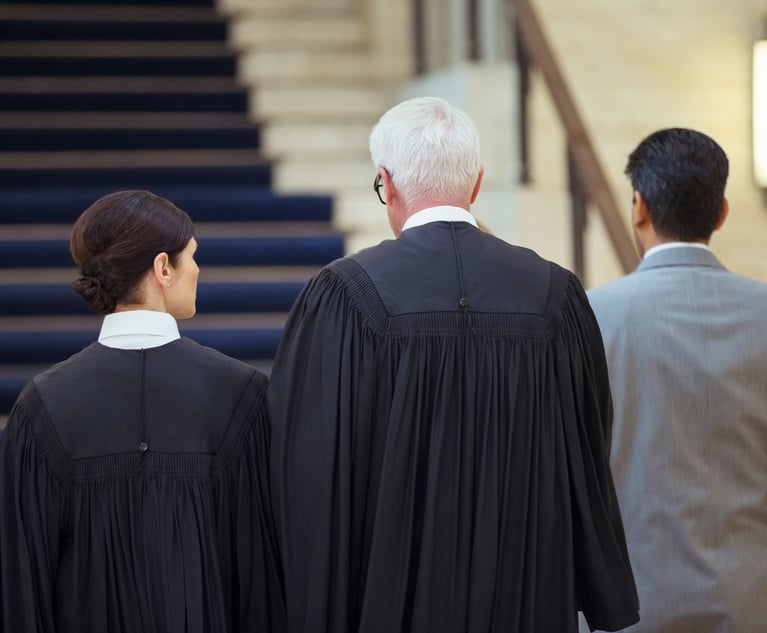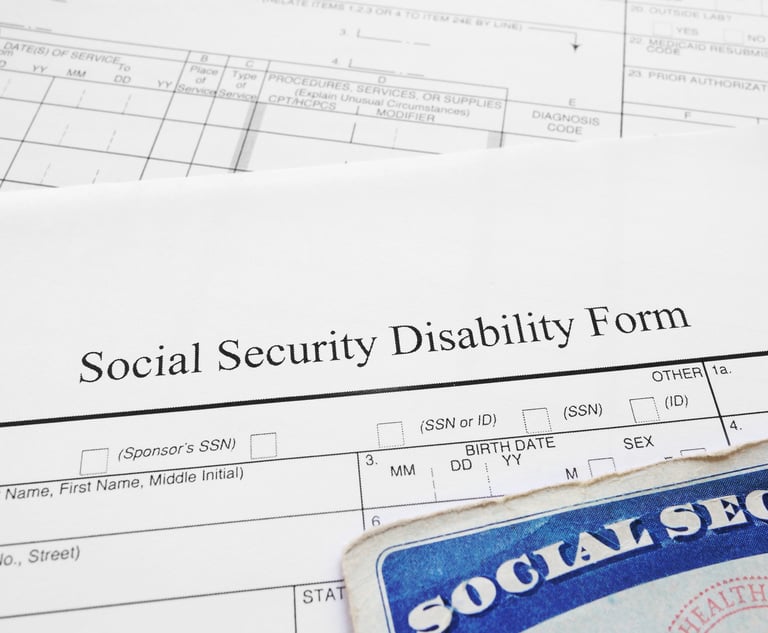Judicial Ethics Opinion 19-151
A part-time judge may serve in an appointive position on the county's emergency medical services advisory board.
July 14, 2020 at 09:55 AM
7 minute read
The Advisory Committee on Judicial Ethics responds to written inquiries from New York state's approximately 3,600 judges and justices, as well as hundreds of judicial hearing officers, support magistrates, court attorney-referees, and judicial candidates (both judges and non-judges seeking election to judicial office). The committee interprets the Rules Governing Judicial Conduct (22 NYCRR Part 100) and, to the extent applicable, the Code of Judicial Conduct. The committee consists of 27 current and retired judges, and is co-chaired by former associate justice George D. Marlow of the Appellate Division and the Honorable Margaret Walsh, a justice of the Supreme Court.
Digest: A part-time judge may serve (1) in an appointive position on the county's emergency medical services advisory board, (2) as assistant chief of the local not-for-profit volunteer fire department elected solely by the organization's members, where the position does not involve peace officer status or any investigative responsibilities, (3) as a volunteer enterprise risk management chair of the local Boy Scout district, where the position involves ordinary health and safety risks in normal scouting activities, and (4) as a scoutmaster for a local Boy Scout troop.
Rules: 22 NYCRR 100.2; 100.2(A); 100.3(A); 100.3(E)(1); 100.4(A)(1)-(3); 100.4(C)(2)(a); 100.4(C)(2)(b); 100.4(C)(3)(a)(i) –(ii); 100.4(C)(3)(b)(i)-(ii), (iv); 100.5(B); Opinions 19-38; 18-152; 18-76; 12-66; 12-58; 11-22; 07-204; 07-146; 05-13; 02-57; 00-33; 95-102; 89-128.
Opinion: A new part-time judge, who is also an emergency medical technician, asks if he/she may continue with several outside activities after assuming judicial office. First, he/she serves on the county's emergency medical services (EMS) advisory board, an appointive and voluntary (not elective) position. The board makes recommendations to the county legislature on how to improve emergency medical services within the county. Second, the judge serves as assistant chief of the local 501(c)(3) not-for-profit volunteer fire department. The assistant chief position is internally elected by the members of the fire department and does not involve peace officer status or have investigative authority. Third, the judge wishes to continue volunteering with certain Boy Scout organizations, both as scoutmaster for a local Boy Scout troop and as volunteer enterprise risk management chair of the local Boy Scout district. As risk management chair, the judge conducts adult leader and youth training, audits safety records, and makes recommendations on matters involving potential risks to health and safety. [1]
A judge must always avoid even the appearance of impropriety (see 22 NYCRR 100.2) and must always act to promote public confidence in the judiciary's integrity and impartiality (see 22 NYCRR 100.2[A]). A judge must disqualify him/herself in any proceeding in which the judge's impartiality "might reasonably be questioned" (22 NYCRR 100.3[E][1]). A judge's judicial duties "take precedence over all the judge's other activities" (22 NYCRR 100.3[A]), and thus his/her extra-judicial activities must be compatible with judicial office and not "cast reasonable doubt on the judge's capacity to act impartially as a judge" or "interfere with the proper performance of judicial duties" (22 NYCRR 100.4[A][1]-[3]). For example, a judge may not accept appointment as a peace officer or police officer (see 22 NYCRR 100.4[C][2][b]) and may not seek public election to non-judicial office (see 22 NYCRR 100.5[B]). However, a part-time judge may generally serve as an officer, director or non-legal advisor of a not-for-profit charitable or civic organization, provided the entity is not likely to be "engaged in proceedings that ordinarily would come before the judge" (22 NYCRR 100.4[C][3][a][i]). A part-time judge, unlike a full-time judge, may also accept appointment to a governmental position that is concerned with issues of fact or policy unrelated to the improvement of the law, the legal system or the administration of justice (see 22 NYCRR 100.4[C][2][a]).
The propriety of a judge's involvement with an emergency medical services advisory board, and/or a volunteer fire department "can be a fact-specific determination" (Opinion 18-152 [discussing prior opinions]). For example, where the position is subject to public election or involves either peace officer status or investigative responsibilities, it is not permissible (see e.g. Opinions 19-38; 18-76; 12-66). Likewise, a new part-time judge may not complete his/her term as a fire commissioner of a taxpayer-supported fire district, where the fire commissioners' primary function is to submit the fire company's budget for public hearing, modification and approval (see Opinion 11-22). Conversely, we have said a judge may serve as an "assistant chief … for a local volunteer fire department" provided the position does not confer peace officer status and does not involve investigative responsibilities (Opinion 02-57).
As described, volunteering on the emergency medical services advisory board and serving as assistant chief of the volunteer fire department do not confer peace officer status, do not involve budgeting issues or investigative responsibilities, and are not subject to public election. [2] Nor do we see any other likely conflict with the judge's judicial responsibilities or the Rules Governing Judicial Conduct. Accordingly, we conclude they are ethically permissible.
Regarding the judge's volunteer positions with the local Boy Scouts, we see no reason why this judge cannot lead a local Boy Scout troop (see Opinion 05-13) or conduct health and safety training for adult leaders and youth, audit safety records and make recommendations on matters involving potential risks to health and safety (see generally 22 NYCRR 100.4[A][1]-[3]). Therefore, this judge may continue these positions, as described, after assuming judicial office.
The judge must, of course, abide by all applicable limitations on judicial speech and conduct, including the prohibitions on fund-raising and membership solicitation (see 22 NYCRR 100.4[C][3][b][i]-[ii], [iv]; Opinions 95-102 [judge must not permit his/her name to be used in fire department's solicitations, including "on the return address" of an envelope seeking contributions]; 00-33 [judge must not chair or otherwise participate in public meetings seeking support for a bond proposition to expand the library]; 89-128 [judge may not act as coordinator in a campaign for the Boy Scouts to collect canned food for the homeless]). Likewise, the judge must disqualify him/herself in any proceeding where his/her impartiality "might reasonably be questioned" due to his/her extrajudicial activities (22 NYCRR 100.3[E][1]; Opinions 07-146 [judge who serves as volunteer fire prevention officer or volunteer scene safety person for a local fire department is disqualified "in any case arising from a fire in which the judge was involved or in any case involving the volunteer fire department"]; 07-204 [town justice who serves as the town's appointed assessor is disqualified, subject to remittal, when "the town appears in his/her court as a party"]).
[1] The "risks" being managed thus appear to be ordinary physical safety risks associated with regular scouting activities, rather than litigation risks. Indeed, nothing in the inquiry suggests the judge's local Boy Scout troop or district is involved in any litigation. If this situation changes, the judge may contact us for further guidance. For now, we merely note that the prohibition on serving as an officer, director, non-legal advisor of an entity that is likely to be "engaged regularly in adversary proceedings in any court" applies only to full-time judges (22 NYCRR 100.4[C][3][a][ii] [emphasis added]).
[2] The advisory board position is appointive, and, as in Opinion 12-58, the assistant chief position is "not elected in a public election but, instead, by the members of the [not-for-profit] corporation."
This content has been archived. It is available through our partners, LexisNexis® and Bloomberg Law.
To view this content, please continue to their sites.
Not a Lexis Subscriber?
Subscribe Now
Not a Bloomberg Law Subscriber?
Subscribe Now
NOT FOR REPRINT
© 2024 ALM Global, LLC, All Rights Reserved. Request academic re-use from www.copyright.com. All other uses, submit a request to [email protected]. For more information visit Asset & Logo Licensing.
You Might Like
View AllTrending Stories
- 1Call for Nominations: Elite Trial Lawyers 2025
- 2Senate Judiciary Dems Release Report on Supreme Court Ethics
- 3Senate Confirms Last 2 of Biden's California Judicial Nominees
- 4Morrison & Foerster Doles Out Year-End and Special Bonuses, Raises Base Compensation for Associates
- 5Tom Girardi to Surrender to Federal Authorities on Jan. 7
Who Got The Work
Michael G. Bongiorno, Andrew Scott Dulberg and Elizabeth E. Driscoll from Wilmer Cutler Pickering Hale and Dorr have stepped in to represent Symbotic Inc., an A.I.-enabled technology platform that focuses on increasing supply chain efficiency, and other defendants in a pending shareholder derivative lawsuit. The case, filed Oct. 2 in Massachusetts District Court by the Brown Law Firm on behalf of Stephen Austen, accuses certain officers and directors of misleading investors in regard to Symbotic's potential for margin growth by failing to disclose that the company was not equipped to timely deploy its systems or manage expenses through project delays. The case, assigned to U.S. District Judge Nathaniel M. Gorton, is 1:24-cv-12522, Austen v. Cohen et al.
Who Got The Work
Edmund Polubinski and Marie Killmond of Davis Polk & Wardwell have entered appearances for data platform software development company MongoDB and other defendants in a pending shareholder derivative lawsuit. The action, filed Oct. 7 in New York Southern District Court by the Brown Law Firm, accuses the company's directors and/or officers of falsely expressing confidence in the company’s restructuring of its sales incentive plan and downplaying the severity of decreases in its upfront commitments. The case is 1:24-cv-07594, Roy v. Ittycheria et al.
Who Got The Work
Amy O. Bruchs and Kurt F. Ellison of Michael Best & Friedrich have entered appearances for Epic Systems Corp. in a pending employment discrimination lawsuit. The suit was filed Sept. 7 in Wisconsin Western District Court by Levine Eisberner LLC and Siri & Glimstad on behalf of a project manager who claims that he was wrongfully terminated after applying for a religious exemption to the defendant's COVID-19 vaccine mandate. The case, assigned to U.S. Magistrate Judge Anita Marie Boor, is 3:24-cv-00630, Secker, Nathan v. Epic Systems Corporation.
Who Got The Work
David X. Sullivan, Thomas J. Finn and Gregory A. Hall from McCarter & English have entered appearances for Sunrun Installation Services in a pending civil rights lawsuit. The complaint was filed Sept. 4 in Connecticut District Court by attorney Robert M. Berke on behalf of former employee George Edward Steins, who was arrested and charged with employing an unregistered home improvement salesperson. The complaint alleges that had Sunrun informed the Connecticut Department of Consumer Protection that the plaintiff's employment had ended in 2017 and that he no longer held Sunrun's home improvement contractor license, he would not have been hit with charges, which were dismissed in May 2024. The case, assigned to U.S. District Judge Jeffrey A. Meyer, is 3:24-cv-01423, Steins v. Sunrun, Inc. et al.
Who Got The Work
Greenberg Traurig shareholder Joshua L. Raskin has entered an appearance for boohoo.com UK Ltd. in a pending patent infringement lawsuit. The suit, filed Sept. 3 in Texas Eastern District Court by Rozier Hardt McDonough on behalf of Alto Dynamics, asserts five patents related to an online shopping platform. The case, assigned to U.S. District Judge Rodney Gilstrap, is 2:24-cv-00719, Alto Dynamics, LLC v. boohoo.com UK Limited.
Featured Firms
Law Offices of Gary Martin Hays & Associates, P.C.
(470) 294-1674
Law Offices of Mark E. Salomone
(857) 444-6468
Smith & Hassler
(713) 739-1250










